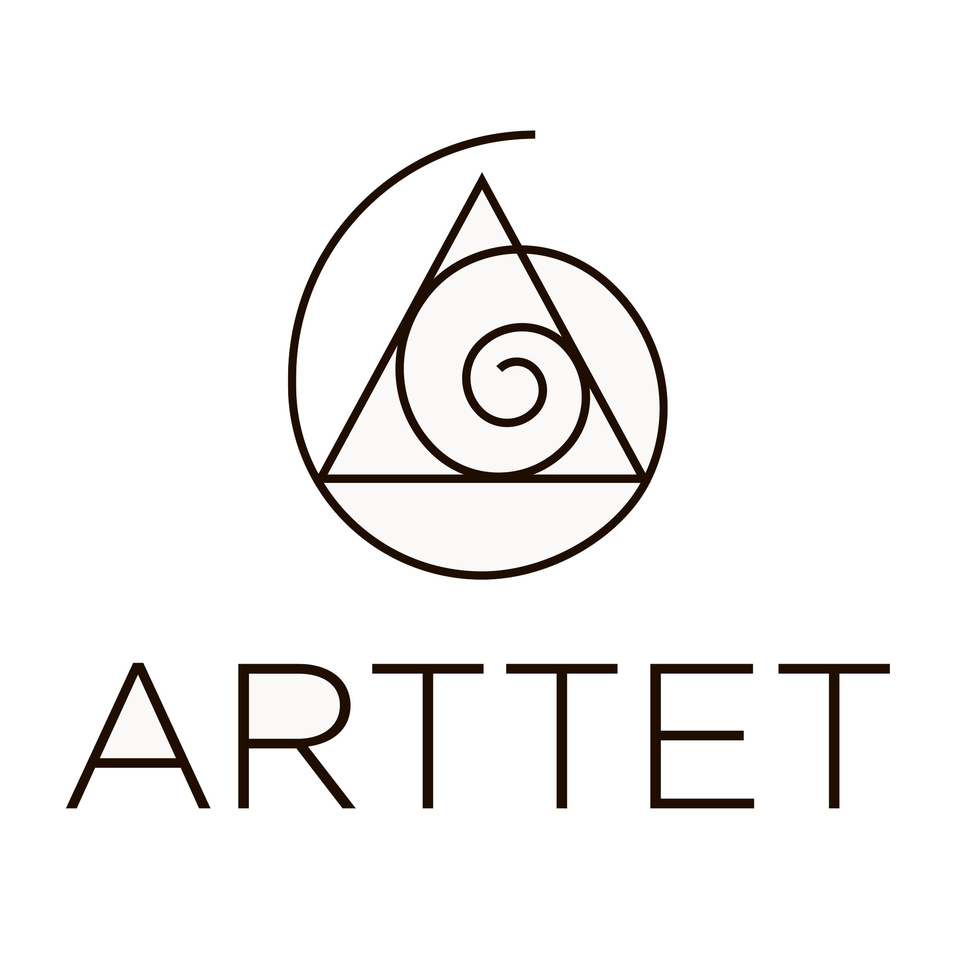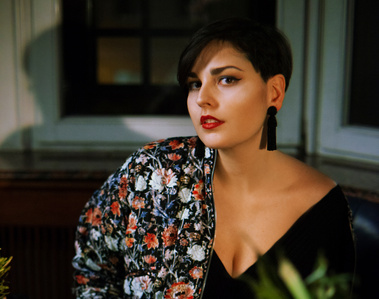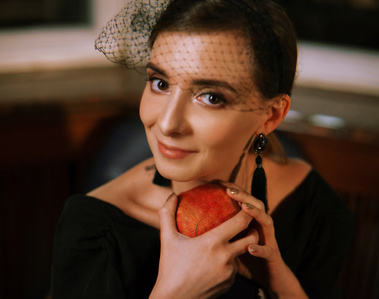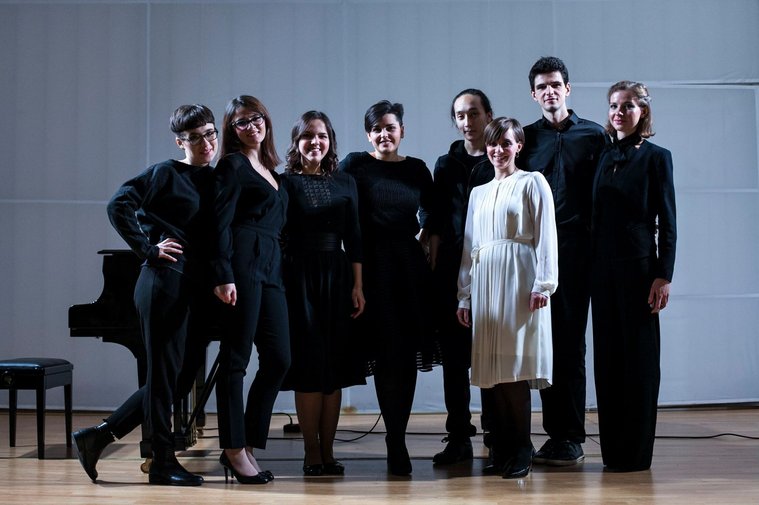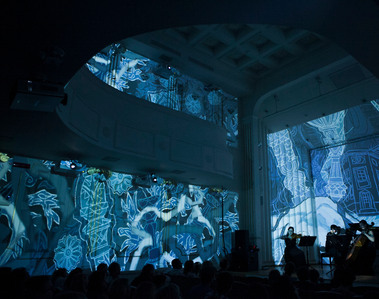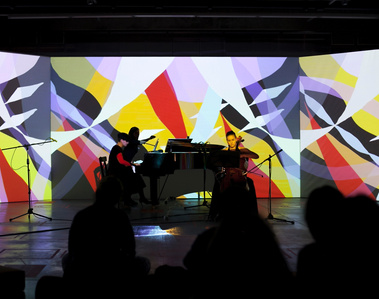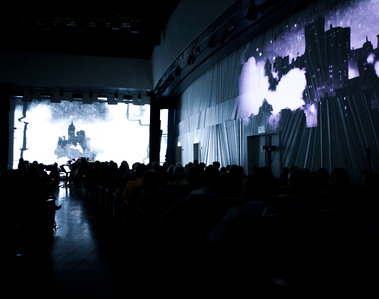Škola Crew
Школа / Škola Crew is a group of musicians and contemporary artists. Their collaborative work is unparalleled in Europe, blending classical music and visual art with an educational aim. It is a blend of multimedia technologies and music: classical music recitals accompanied by visual art. Besides, every performance is preceded by a mini-lecture telling the audience about the history of the genre, the biography of this or that composer and composition, which makes it possible not only to enjoy a professional interpretation of classical music but also better understand the context. Every composition is coupled with a unique visual illustration.
ARTTET had a conversation with the founder of the project Alexandra Stephanova ahead of their participation in the discussion on the topic “Gender stereotypes in creative industries” on November 22nd in the framework of the International Forum of Creative Industries ART-WERK 2019. We asked Alexandra some questions about the history, concept, mission and main goals of the project.
Alexandra Stephanova - classical musician (piano). Alexandra began her music education at the age of 5. In 2007 she graduated the Moscow Gnessin Music School, in 2013 - the Maimonides State Classical Academy
Valeriya Sanchillo - visual artist, in 2016 Valeriya graduated the Gerasimov institute of Cinematography, where she got a Master's Degree in computer graphics art and animation.
How it all began
Alexandra Stephanova:
"I finished a prestigious Moscow music school and later got my Master’s and postgraduate music degrees in performing arts (piano). This kind of education has always been associated with an old-fashioned closed society, that has its strict rules. So, if you want to make a career in this field, there are very few options. I can't say that the ideal life of a successful classical pianist was my goal. I never liked the lack of freedom that the industry dictated in return for success. I deeply love classical music, and I love performing on stage, but the rules of that industry are not for me. So, four years ago I set up my own rules and chose my own path in life - I created Škola Crew. A little later, I was joined by my friends and colleagues Lera Sanchillo (aka Wanella), our main background artist, and Lidia Kalmikova, our coordinator (but she does so much more), with whom we think through all our strategies together.
About the Crew
I'm so lucky to have all these people around me. Most of our musicians are graduates of thе Moscow Conservatory, who work with different renowned orchestras in Moscow. All of our background artists are graduates of the Gerasimov Cinematography College. They are professionals in the multimedia art area. Though quite young, many of them have already achieved very high results. All of my “crewmen” are very talented musicians and artists with whom I’m lucky to work side by side.
Idea of the project
The idea was to make Škola Crew look nothing like an ordinary classical music project. That’s why I interact with the audience during the show, I can make a joke, or answer a question. I want people to relax and enjoy the show.
A listener can gain anything from a classical music recital, just as from any kind of art, - inspiration, understanding of the meaning of life, anything at all. The only problem is that listening to classical music may require a little more involvement and concentration, not everyone is ready for that. Our project has an educational aim. We want people who are far from classical music discover the vast and varied realm of the great art. It may not be that easy to comprehend at first but we will be your guides.
My colleagues and I honestly think that “unbuckling a pair of buttons on a tight shirt” may help you enjoy the strict classical art. At the same time, I don’t think that the genre of a classical music concert, should totally disappear. There are different sorts of audiences with absolutely different levels of understanding art. Some enjoy listening to a very sophisticated classical piece in a traditional venue with its uptight rules, others need information and multimedia technology. And both are okey. To each his own. We’ve chosen our audiences and we know that they may need a little nudge and information to comprehend classical music. I personally hope that one day our ideal listener won’t be afraid to attend a conventional classical music concert and may even enjoy it.
Principles of work: venues, visuals, imagination
We combine background art animation with classical music, so both media are equally important. Our main stage is the Moscow Scriabin Museum. The hall of the Museum is equipped with twelve projectors, a control room with proper software and a fine Steinway grand piano. The hall has beautiful natural acoustics. This venue has everything we need for our shows.
In the past couple of years, we have performed not only at the Scriabin Museum, but at different other venues. Some of them were better equipped, others were better in natural acoustics. For instance, the concert hall of the “Sirius” Educational Center in Sochi is situated in the former International Broadcasting Center of the Sochi Olympics. It’s a huge premise that doesn’t really suit classical music performances. It lacks natural acoustics, so we had to use microphones. We had to use microphones at the MCA Garage as well. But both of those venues were very well equipped with multimedia technology (projectors, proper software, video technicians, etc). There is nothing bad in using microphones during a classical music recital, but there are certain difficulties. First of all, musicians are trained to listen to the sound that their instruments produce and how that sound works in the hall we perform in. But when microphones are used, you don’t really understand what the audience hears. And here comes another problem - when performing with microphones it is essential to have a very good sound engineer on site. This sound engineer should foresee, or rather “forehear”, how everything will sound during the performance.
Last summer we performed at the newly established Zaryadye Hall in Moscow which has fantastic acoustics. It is sheer bliss for a musician to perform there. But unfortunately, we had certain difficulties with our projections. So, as you may have noticed, it is hard to find an ideal venue for our events. And that is one of the main obstacles, that’s why we don’t travel much.
We combine animated digital art illustrations, that are done in different sorts of styles. Artists from our crew work in film production, theater and print art. They use their knowledge and experience in those areas while making background art for our concerts. Let’s call it experimental digital art. I don’t know of anyone doing the same kind of shows we do, so we just do not know what it should be called properly. Our artists combine visual and narrative components. At the same time, we don’t want to prompt ready-made solutions to our audiences. We want to leave some room for their own imagination.
About the Vlog
The idea was to support our book to be published next year at the “Eksmo” publishing house. I’m writing it, and my fellow crew-artist will illustrate it. The book will deal with classical music history from the ancient period to the first half of the 20th century. The book is addressed to people who have no clue what classical music is and where to start. Apart from the information and illustrations in the book, each chapter will be followed by a link to a music example for the reader to listen to. I think it is stupid only to read about music. You’ll never learn to love classical music if you never actually listen to it.
BookBlog, Issue 15. Follow the channel Škola Crew on Youtube to watch more!
Gender questions in classical music
I would want the future to be open to really talented people regardless of their sexual orientation or gender.
It’s an open secret that for a long-long time women’s activity was limited to motherhood and housekeeping. We’ve all heard of massive scandals in the movie society. All these talks of equal pay and letting women decide what career suits them better relate to the classical music industry as well. Can you imagine that in Russia you can still hear people say that the cello is not a woman's instrument! Or some people claim that instruments sound worse if they are played by women! Have you ever heard of a well-known Russian woman conductor?
Thank God, this situation is slowly but surely changing all over the world. But I don't live in England or Germany, and the things my female colleagues and I have to deal with remind one of the dark middle ages. You will never be promoted to a principal position in an orchestra if you are female. Of course, there may be some exceptions, but they are just exceptions. Women have to try ten times harder than men to prove their worth. Yes, I can put myself in some manager’s shoes and I do understand that there may be coordinational complications in the working process because some young women may suddenly decide to have a family and they will need a leave to have a baby. But women must be allowed to combine family and career, don’t you think? It is only fair. There are dozens of other problems too, and the main among them is that in Russia there are very few people who want to acknowledge them as actual problems. Hard work, talent and professionalism are the three key factors that matter in playing the piano, or any other instrument. Everyone must have a right to choose his or her own path in life and your sex shouldn’t be an obstacle to achieving your goals".
Blitz Questions
Favorites in music?
My music taste is extremely versatile. I enjoy listening to late English Renaissance music and the music of the Baroque period. Or it may be the music of the mid 20th century, it depends. Still there are a few composers that I can call my favourites. J.S. Bach, Paul Hindemith, W.A. Mozart and Sergei Rachmaninoff. To make it quite clear, I don't only listen to classical music. I'm an ordinary human being, I listen to tons of pop music as well.
Source of Inspiration?
I love to travel, my friends are a big scoop of inspiration for me. Pretty trivial, I know:) I enjoy watching English and American drama series. “The Crown”, “Endeavour”, “Goliath”, “Peaky Blinders”, ”Marvelous Mrs. Maisel”, “Ray Donovan”, “Man in the High Castle”, ''Fleabag”, ''Mindhunter”, ”The Alienist” etc. I watch so many of them, that if I name every show a like, this interview will never end :)
What kind of music should become classical?
Recently I was lucky to attend a public talk by Gillian Moore (she curates the musical policy of the Southbank Centre in London) at the MCA Garage. She was asked exactly the same question by a man in the audience. And she didn’t have a clearcut answer to that either, but then she replied that maybe it should be the sort of music that makes you stop everything you are doing at the moment, and just sit and listen.
What would you like to improve in the process of performing classical music nowadays?
I would like the industry to let dissenters like us be heard.
The main goal of your project?
To conquer the world, naturally :)
Interview: Julia Tet
November 2019
Moscow
